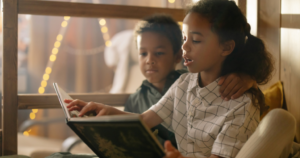The compliment was simple: “You did a great job on that presentation.” But watch closely—there’s a specific type of person who responds to praise like they’ve been handed a live grenade. The smile becomes rigid. Eyes dart toward exits. They deflect with jokes, immediately point out flaws, or redirect credit so fast it gives you whiplash.
“It was nothing, Jennifer did most of the work, I just threw some slides together, probably too many fonts, did you notice that transition error on slide twelve?”
This isn’t modesty. It’s something deeper—a learned response from childhoods where kindness came with hidden costs. Where approval was currency in an economy they could never quite understand. These adults move through the world treating genuine niceness like a trap they’re too smart to fall for this time.
1. Kindness was transactional
In these households, nice preceded need. A parent’s sudden warmth meant they wanted something—a performance for relatives, silence about family problems, allegiance in marital warfare. Compliments came with invoices attached. “You’re so smart” meant “so you’ll understand why I need you to lie to your father.” “You’re such a good kid” meant “so you won’t make a fuss about moving again.”
Children learned to brace when parents got too friendly. They became tiny actuaries, calculating the cost of every kind word. Now as adults, when someone’s genuinely nice, their nervous system still runs that familiar math: What do they want? What will this cost me? When does the bill come due?
The panic isn’t paranoia—it’s pattern recognition from a time when it kept them safe.
2. Emotional weather changed without warning
Breakfast could be peaceful. By lunch, the house was a war zone. The parent who praised your artwork at 9 AM might be destroying it by noon. No trigger you could identify or avoid—just sudden storms in clear skies.
These children became meteorologists of mood, but the weather never followed patterns. They learned that good moods were temporary, that kindness could flip to cruelty without warning. Safety meant never fully trusting the calm.
Now someone’s consistent kindness feels like waiting for lightning. The longer it lasts, the bigger the storm must be building. They can’t relax into nice because experience taught them it’s just the eye passing over.
3. Love came with scorekeeping
“After everything I’ve done for you.” The family ledger where every act of care was recorded for future collection. Birthday parties became debt. Christmas presents were investments. Basic parenting was a favor requiring lifelong gratitude.
Children in these homes learned love was a loan system with compound interest. Every kindness increased what they owed. They became hyperaware of the balance sheet, trying to stay even, knowing they could never really pay it back.
As adults, they panic at kindness because they can’t calculate the interest rate. A friend’s thoughtful gesture feels like accumulating debt. They over-reciprocate immediately, desperate to balance books only they are keeping.
4. Vulnerability was ammunition
Share a fear, hear it wielded against you later. Admit a crush, become the family punchline. Cry about something, have it minimized then broadcast to relatives. These homes turned children’s tender moments into weapons for future use.
“Remember when you cried about that silly thing?” became a silencing tactic. Private admissions became public humiliations. The child learned: vulnerability is voluntary harm. Trusting someone with your soft parts is handing them ammunition.
Now when people are kind—really kind, the kind that invites openness—these adults feel the familiar trap. Kindness wants vulnerability. Vulnerability means exposure. Exposure means eventual harm. The math is reflexive, protective, and wrong for present circumstances but right for past ones.
5. Attention meant danger
In these families, being noticed was never neutral. Positive attention (“Look how pretty she is!”) came with performance pressure and later criticism. Negative attention brought consequences. The safest place was invisible—neither praised nor punished, neither seen nor scene.
Children became experts at middle ground, at being good enough to avoid punishment but not so good they attracted expectation. They learned to deflect attention like prey animals, knowing the spotlight burned no matter why it found them.
Adult kindness—which often involves being seen, appreciated, acknowledged—triggers that old alarm. Being noticed feels dangerous. Being appreciated means being visible. Being visible means being targeted. The panic is a ghost of a time when attention, even positive, was never just attention.
6. Inconsistent rules, constant punishment
Yesterday’s praised behavior became today’s violation. Rules changed without announcement. What pleased one parent enraged the other. The only consistency was that you’d somehow done it wrong.
These children developed hypervigilance, trying to track shifting expectations. They became shape-shifters, reading micro-expressions to guess today’s rules. But the game was rigged—the rules changed specifically to ensure failure.
Now consistent kindness breaks their brain. They’re waiting for the rules to shift, for the kindness test they’re about to fail. Someone being nice for the third time triggers panic: What are the rules here? What am I missing? When do I find out what I’ve done wrong?
7. Good things were taken away
Show too much joy about a toy, watch it disappear. Love a pet too visibly, find it rehomed. Make a friend, suddenly move neighborhoods. In these homes, loving something was painting a target on it.
Children learned to hide their attachments, to perform indifference about what mattered most. They became skilled at wanting nothing too much, at distributing their care so thinly nothing could be identified as leverage.
When someone’s consistently kind now, they panic at the impending loss. History says this good thing will be removed, probably at peak attachment. They preemptively detach, sabotage, or minimize to beat the universe to the punch. If you don’t care too much, it can’t hurt when it goes.
Final thoughts
The panic when people are nice isn’t ingratitude or suspicion—it’s a learned response from environments where kindness was complicated, costly, or dangerous. These adults aren’t broken; they’re carrying outdated survival software from childhoods where that programming kept them safer.
The cruel irony is that the warmth they needed then becomes the warmth they can’t tolerate now. Their panic at kindness is a measure of how much they needed it and how rarely it came without conditions. They’re not rejecting connection—they’re protecting themselves from the kind of “kindness” they knew first.
Healing happens slowly, through consistent experiences of kindness without cost. Through people who stay nice even when you panic, who don’t take your deflection personally, who understand that your discomfort with their care is actually evidence of how much you need it.
The panic may never fully disappear. But maybe it becomes a whisper instead of a scream. Maybe kindness becomes something to breathe through rather than run from. Maybe “thank you” becomes possible without calculating the cost.
















